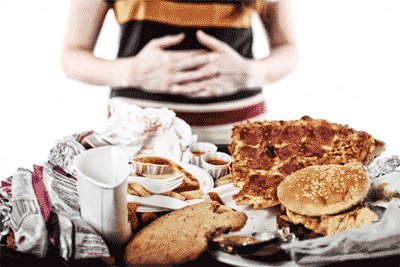 Do you ever eat far more food than others would in a similar period of time? Do you ever feel like your eating is out of control and you can’t stop? Do you ever try to eat alone or hide your eating from others? Do you tend to feel bad about yourself after doing so?
Do you ever eat far more food than others would in a similar period of time? Do you ever feel like your eating is out of control and you can’t stop? Do you ever try to eat alone or hide your eating from others? Do you tend to feel bad about yourself after doing so?
If so, it’s possible you have a condition called Binge Eating Disorder (B.E.D.).
What Is Binge Eating Disorder?
B.E.D. is an eating disorder characterized by recurring episodes of binge eating, feeling out of control during a binge, and then feeling guilt and shame after the binge ends. In fact, it’s the most common eating disorder in the United States, affecting approximately 3% of the population. It is also estimated that between 30% to 40% of people seeking weight loss treatment could be clinically diagnosed with B.E.D.
It’s also very important to note that binge eating disorder is NOT a choice and it is NOT about having a lack of willpower. It’s a serious condition with serious long-term health risks if not treated.
What Are The Symptoms?
B.E.D. goes beyond the occasional overeating episode, which most people do from time to time.
According to the DSM-5, binge eating disorder (BED) is characterized by several behavioral and emotional signs or symptoms:
- Recurrent episodes of binge eating occurring at least once a week for three months
- Eating a larger amount of food than normal during a short time frame (any two-hour period)
- Lack of control over eating during the binge episode (feeling you can’t stop eating or control what or how much you are eating)
Binge eating episodes are associated with three or more of the following:
- Eating until feeling uncomfortably full
- Eating large amounts of food when not physically hungry
- Eating much more rapidly than normal
- Eating alone out of embarrassment over quantity eaten
- Feeling disgusted, depressed, ashamed, or guilty after overeating
In addition:
- Marked distress regarding binge eating is also present
- Binge eating is not associated with frequent inappropriate compensatory behavior, such as purging, excessive exercise, etc.
- Binge eating does not occur exclusively during the course of bulimia nervosa or anorexia nervosa
What Causes Binge Eating Disorder?
Like other eating disorders, B.E.D. results from a combination of psychological, biological, and environmental factors. The combination of causes and risk factors varies from person to person but possible factors include:
- Genetic / Family Predisposition
- Restrictive dieting or irregular eating patterns that lead to a “breaking point” and a binge
- Depression, anxiety, and other mood disorders
- Experiences of weight stigma, weight-related discrimination, or bullying
- Problems with family or other significant relationships
- Significant trauma or abuse
- Addictions to drugs/alcohol
What Are The Treatment Options?
Please know that it is highly unrealistic to think you can “beat” B.E.D. on your own. You need help. Treatment is necessary. And one of the most important factors is to seek help as soon as you become aware that you may have an issue.
There are a variety of approaches. However, it’s important to realize that approximately half of all people with B.E.D. also have some form of depression or other mood disorder. And, often, the most effective treatments start by addressing the mood issue first.
Therefore, it’s usually in your best interest to see a provider who specializes in eating disorders and who has the training to see deeper into the issue. Many treatments are available, ranging from psychotherapy to highly effective medications, and the right specialist can help tailor a plan to best meet your needs.
For more information on the issue of Binge Eating Disorder, please contact our office at amanda.itzkoff@gmail.com. And, if you feel you could use additional help, please contact our office at 917-609-4990 to arrange a consultation..
